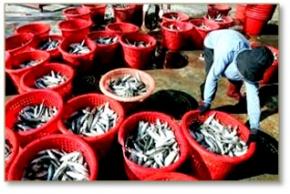ID :
189423
Sat, 06/18/2011 - 11:58
Auther :
Shortlink :
http://m.oananews.org//node/189423
The shortlink copeid
ASEAN approves cooperative framework for sustainable fisheries

BANGKOK, June 18 (TNA) - An ASEAN ministerial meeting of nine nations and the Southeast Asian Fisheries Development Center (SEAFDEC) has approved a cooperative framework for sustainable fisheries in the region, being in line with the ASEAN Charter.
Concerned ministers of eight member countries of the Association of Southeast Asian Nations (ASEAN), including Brunei, Indonesia, Laos, Myanmar, Malaysia, Singapore, Vietnam and Thailand, as well as Japan and the SEAFDEC jointly announced the resolution and action plans for sustainable fisheries and food security in the region after their two-day meeting in Bangkok on Friday, saying that the implementation of the resolution and the action plans was set to continue until 2020.
The 23-item cooperative framework covers all dimensions of regional fisheries, including the cultivation of aquatic animals, the development of efficient fishery management, the empowerment of fishing communities and partnership among members of the meeting. The participating ASEAN ministers said they believed that the agreed framework would enable member states to ensure sustainable fisheries in their own countries and to further boost regional cooperation in fisheries; while also enhancing the competitiveness of Southeast Asian fishery products on the world market.
The ASEAN-SEAFDEC Conference on “Sustainable Fisheries for Food Security towards 2020” was held at the Sofitel Centara Grand Hotel in Bangkok from June 16-17 to raise regional awareness on the role and importance of fisheries in food security and well-being of people.
Meanwhile, Somying Piamsombun, Director-General of the Fisheries Department under the Thai Ministry of Agriculture and Cooperatives, noted that Thailand has remained the world’s third largest exporter of aquatic animals, especially prawns and mackerels, with Europe, the United States and Japan being its major markets.
Somying proposed, however, that ASEAN member countries collectively develop their fisheries and produce safe products which meet international standards and avoid trade barriers to maintain regional competitiveness and large-scale fisheries exports. (TNA)
Concerned ministers of eight member countries of the Association of Southeast Asian Nations (ASEAN), including Brunei, Indonesia, Laos, Myanmar, Malaysia, Singapore, Vietnam and Thailand, as well as Japan and the SEAFDEC jointly announced the resolution and action plans for sustainable fisheries and food security in the region after their two-day meeting in Bangkok on Friday, saying that the implementation of the resolution and the action plans was set to continue until 2020.
The 23-item cooperative framework covers all dimensions of regional fisheries, including the cultivation of aquatic animals, the development of efficient fishery management, the empowerment of fishing communities and partnership among members of the meeting. The participating ASEAN ministers said they believed that the agreed framework would enable member states to ensure sustainable fisheries in their own countries and to further boost regional cooperation in fisheries; while also enhancing the competitiveness of Southeast Asian fishery products on the world market.
The ASEAN-SEAFDEC Conference on “Sustainable Fisheries for Food Security towards 2020” was held at the Sofitel Centara Grand Hotel in Bangkok from June 16-17 to raise regional awareness on the role and importance of fisheries in food security and well-being of people.
Meanwhile, Somying Piamsombun, Director-General of the Fisheries Department under the Thai Ministry of Agriculture and Cooperatives, noted that Thailand has remained the world’s third largest exporter of aquatic animals, especially prawns and mackerels, with Europe, the United States and Japan being its major markets.
Somying proposed, however, that ASEAN member countries collectively develop their fisheries and produce safe products which meet international standards and avoid trade barriers to maintain regional competitiveness and large-scale fisheries exports. (TNA)





